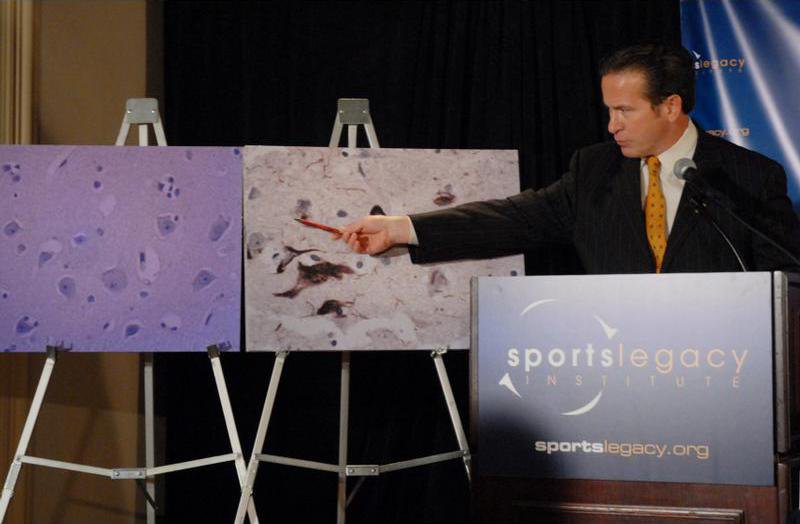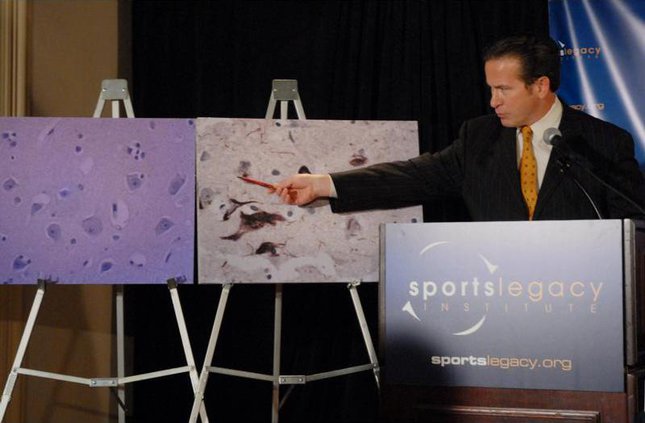ATLANTA — Pro wrestler Chris Benoit suffered brain damage from his years in the ring that could help explain why he killed his wife, son and himself, a doctor who studied Benoit’s brain said Wednesday.
The analysis by doctors affiliated with the Sports Legacy Institute suggests that repeated concussions could have contributed to the killings at Benoit’s suburban Atlanta home.
An Emory University neurologist not involved in the testing agreed that multiple concussions can cause long-term brain injuries, but she stressed that ‘‘what types of symptoms that causes is still very unclear.’’
The wrestler’s father, Michael Benoit, told reporters Wednesday that he knows his son had concussions because his son told him so, but he also said he knows of no medical records or records kept by the wrestling league to support the diagnosis.
Steroid use also has lingered as a theory behind the killings, since anabolic steroids were found in Chris Benoit’s home and tests conducted by authorities showed Benoit had roughly 10 times the normal level of testosterone in his system when he died.
The institute, which researches the long-term effects of concussions, coordinated the testing using samples of Benoit’s brain tissue provided by the Georgia Bureau of Investigation.
The Waltham, Mass.-based institute’s president is former pro wrestler Christopher Nowinski, who has said he had to quit the ring after a kick to the head. Nowinski still has ties with World Wrestling Entertainment Inc., which runs the league he and Benoit were in.
A lawyer for Stamford, Conn.-based WWE did not immediately return a call Wednesday seeking comment. The company has maintained steroid use did not cause Benoit to snap.
Despite the results of the institute’s tests, there was no way to know for sure if Benoit’s concussions contributed to the murder-suicide, said Dr. Robert Cantu, a member of the institute who also is chief of neurosurgery service at Emerson Hospital in Concord, Mass.
‘‘Whether it is the sole factor I believe is speculation and I will not go there,’’ Cantu said by phone.
The level of brain damage Benoit had can cause depression and irrational behavior, Cantu said.
Benoit’s brain showed the same degenerative processes that doctors working for the institute found in the brains of two men who had played pro football and committed suicide, Cantu said. There were abnormal protein deposits caused by trauma to Benoit’s brain, Cantu said.
There’s no evidence that steroid use causes such protein deposits, Cantu said, though he noted the issue has not been exhaustively studied.
Investigators allowed the institute to test Benoit’s brain tissue with the permission of his father, who lives near Edmonton in Ardrossan, Alberta.
Dr. Wendy Wright, an intensive care neurologist at Emory University Hospital in Atlanta, said suffering multiple concussions can lead to behavioral changes. But she said, ‘‘This isn’t something you would expect to see turn on one day and have someone fly into a vicious rage.’’
Benoit’s wife had filed a complaint in 2003 alleging ‘‘cruel treatment’’ and that he broke some furniture in their home, but investigators have disclosed no other evidence of violence by Benoit outside the ring prior to the killings. The wife’s complaint was later withdrawn. His father also said the wrestler seemed perfectly normal just a week before the killings.
Michael Benoit said Wednesday that he agreed to the testing of his son’s brain because murder-suicide was so out of character. He also disclosed that after the killings, he discovered a diary written by his son that showed his son was having problems.
‘‘After reading the diary, I would have thought it was written by someone who was extremely disturbed at the time,’’ Michael Benoit said.
He did not elaborate, but he did say a friend told him that prior to the murder-suicide, Chris Benoit had been wearing a rosary, which he said was also out of character.
‘‘I think it’s the extreme that is in the wrestling industry today,’’ he told reporters. ‘‘The human skull is not built to get hit by a chair or something.’’
The father said he has not discussed with his attorney whether to take any legal action against the WWE or anyone else in the case.
Nowinski, who works for the WWE on its initiative to encourage young people to vote, said concussions can happen in pro wrestling even though many of the moves are staged.
Richard Decker, an attorney for the mother of Benoit’s slain wife, said the brain test results ‘‘don’t make a lot of difference to us.’’
‘‘Even if the theories about the effects of continuing trauma on Chris’ personality are accurate, they don’t rule out Chris’ excessive steroid use, which we know he was involved in, as a factor in the murders,’’ Decker said. ‘‘In either case, it wouldn’t excuse his conduct.’’
Prosecutors have said Benoit, 40, strangled his wife with a cord, used a choke hold to strangle his 7-year-old son, placed Bibles next to the bodies and hanged himself on a piece of exercise equipment the weekend of June 22.
Authorities have said Benoit’s personal doctor, Phil Astin, prescribed a 10-month supply of anabolic steroids to Benoit every three to four weeks between May 2006 and May 2007. Astin has pleaded not guilty to federal charges of improperly prescribing painkillers and other drugs to two patients other than Benoit.
———
Associated Press Writer Jason Bronis contributed to this report from Atlanta.
The analysis by doctors affiliated with the Sports Legacy Institute suggests that repeated concussions could have contributed to the killings at Benoit’s suburban Atlanta home.
An Emory University neurologist not involved in the testing agreed that multiple concussions can cause long-term brain injuries, but she stressed that ‘‘what types of symptoms that causes is still very unclear.’’
The wrestler’s father, Michael Benoit, told reporters Wednesday that he knows his son had concussions because his son told him so, but he also said he knows of no medical records or records kept by the wrestling league to support the diagnosis.
Steroid use also has lingered as a theory behind the killings, since anabolic steroids were found in Chris Benoit’s home and tests conducted by authorities showed Benoit had roughly 10 times the normal level of testosterone in his system when he died.
The institute, which researches the long-term effects of concussions, coordinated the testing using samples of Benoit’s brain tissue provided by the Georgia Bureau of Investigation.
The Waltham, Mass.-based institute’s president is former pro wrestler Christopher Nowinski, who has said he had to quit the ring after a kick to the head. Nowinski still has ties with World Wrestling Entertainment Inc., which runs the league he and Benoit were in.
A lawyer for Stamford, Conn.-based WWE did not immediately return a call Wednesday seeking comment. The company has maintained steroid use did not cause Benoit to snap.
Despite the results of the institute’s tests, there was no way to know for sure if Benoit’s concussions contributed to the murder-suicide, said Dr. Robert Cantu, a member of the institute who also is chief of neurosurgery service at Emerson Hospital in Concord, Mass.
‘‘Whether it is the sole factor I believe is speculation and I will not go there,’’ Cantu said by phone.
The level of brain damage Benoit had can cause depression and irrational behavior, Cantu said.
Benoit’s brain showed the same degenerative processes that doctors working for the institute found in the brains of two men who had played pro football and committed suicide, Cantu said. There were abnormal protein deposits caused by trauma to Benoit’s brain, Cantu said.
There’s no evidence that steroid use causes such protein deposits, Cantu said, though he noted the issue has not been exhaustively studied.
Investigators allowed the institute to test Benoit’s brain tissue with the permission of his father, who lives near Edmonton in Ardrossan, Alberta.
Dr. Wendy Wright, an intensive care neurologist at Emory University Hospital in Atlanta, said suffering multiple concussions can lead to behavioral changes. But she said, ‘‘This isn’t something you would expect to see turn on one day and have someone fly into a vicious rage.’’
Benoit’s wife had filed a complaint in 2003 alleging ‘‘cruel treatment’’ and that he broke some furniture in their home, but investigators have disclosed no other evidence of violence by Benoit outside the ring prior to the killings. The wife’s complaint was later withdrawn. His father also said the wrestler seemed perfectly normal just a week before the killings.
Michael Benoit said Wednesday that he agreed to the testing of his son’s brain because murder-suicide was so out of character. He also disclosed that after the killings, he discovered a diary written by his son that showed his son was having problems.
‘‘After reading the diary, I would have thought it was written by someone who was extremely disturbed at the time,’’ Michael Benoit said.
He did not elaborate, but he did say a friend told him that prior to the murder-suicide, Chris Benoit had been wearing a rosary, which he said was also out of character.
‘‘I think it’s the extreme that is in the wrestling industry today,’’ he told reporters. ‘‘The human skull is not built to get hit by a chair or something.’’
The father said he has not discussed with his attorney whether to take any legal action against the WWE or anyone else in the case.
Nowinski, who works for the WWE on its initiative to encourage young people to vote, said concussions can happen in pro wrestling even though many of the moves are staged.
Richard Decker, an attorney for the mother of Benoit’s slain wife, said the brain test results ‘‘don’t make a lot of difference to us.’’
‘‘Even if the theories about the effects of continuing trauma on Chris’ personality are accurate, they don’t rule out Chris’ excessive steroid use, which we know he was involved in, as a factor in the murders,’’ Decker said. ‘‘In either case, it wouldn’t excuse his conduct.’’
Prosecutors have said Benoit, 40, strangled his wife with a cord, used a choke hold to strangle his 7-year-old son, placed Bibles next to the bodies and hanged himself on a piece of exercise equipment the weekend of June 22.
Authorities have said Benoit’s personal doctor, Phil Astin, prescribed a 10-month supply of anabolic steroids to Benoit every three to four weeks between May 2006 and May 2007. Astin has pleaded not guilty to federal charges of improperly prescribing painkillers and other drugs to two patients other than Benoit.
———
Associated Press Writer Jason Bronis contributed to this report from Atlanta.

